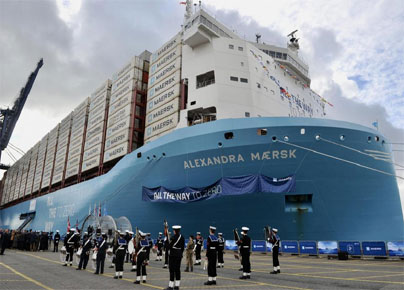Alternative Fuel Developments
2025-03-21

Using alternative fuels to fossil-derived products across a wide range of logistics applications continues to increase as companies move toward more environmentally friendly operations with zero or low emissions—electricity, hydrogen, compressed natural gas (biomethane), or methanol.
Now that many retailers have rigorous sustainability policies, they will seek out and favour 'green' partner companies over their less sustainable competitors. An example of this is the introduction by Maersk of the fifth ship in a series of 18 sizeable dual-fuel methanol vessels scheduled for delivery from last Autumn through 2025. The 'Alexandra Maersk' – 47,700 tonnes and 16,592 TEU – was named in a ceremony at Felixstowe last October. These new methanol-enabled ships are at the core of Maersk's ambitious decarbonisation plans, as low-emission ethanol can reduce greenhouse gas (GHGH) emissions by 65 to 90 per cent.
A major user of Maersk's services is the well-known British and international retailer Primark, which employs more than 80,000 people across 17 countries. During the naming ceremony, their CEO, Paul Marchant, said: "We're committed to reducing our impact on the environment across our entire operation, including our supply chain. Through our partnership with Maersk, we've started introducing green fuel alternatives when shipping our products. By using Maersk's ECO Delivery Ocean product and replacing fossil fuels with green fuel alternatives, we reduce our greenhouse gas (GHG) emissions in ocean shipping."
On a somewhat different scale, Carisbrooke Shipping, based on the Isle of Wight and Rotterdam, operates 26 vessels between 5,000 and 17,000 tonnes in European waters. Natalia Walker of Carisbrooke explained: "We're part of a consortium, led by Carnot Ltd, which has been awarded £2.3 million to deploy its 70% efficient 50kW marine hydrogen engine to provide auxiliary power on a general cargo vessel. The project will explore how hydrogen can generate electrical power on board cargo vessels. The demonstrator vessel – the 'Kathy C' (4,151 tonnes) – is a UK-flagged general cargo vessel designed to carry multiple types of dry cargo from grain to aggregates and is scheduled to undergo real-world testing this year."
The Carnot 50-kW engine is a precursor to 200 to 400-kW auxiliary engines, eventually to 1 top 10MW main engine. The hydrogen fuel is supplied by Compass Syngas Solutions, based in Deeside, Wales. Compass Syngas Solutions secured almost £4 million in government funding to make its biomass and waste-to-hydrogen plants even greener by using carbon capture from its hydrogen production from waste wood and other selected non-recyclable materials.
Electric Vans
On land, many developments are taking place, which depend on operating requirements: Vauxhall has started customer trials with its Vivaro hydrogen van, involving some of the UK's largest fleets. James Taylor, Vauxhall's MD, said: "As the UK's best-selling electric van manufacturer for the past three years, we're already leading the way in electrifying Britain's businesses." To emphasise this, Royal Mail has just delivered its 6,000th electric vehicle.
Marks and Spencer has introduced 85 lower-emission vehicles to its fleet. Five are battery-electric Renault 42-tonne units, delivering to 30 M&S across London and the Southeast. In addition, 80 new trucks, fuelled by compressed natural gas (biomethane), will join the fleet, 50 of these being operated by Gist in its food supply chain system. Julian Bailey, Head of Group Transport at M&S, commented: "Adapting our logistics network is vital in achieving our Plan A Net Zero ambition. We're committed to reducing carbon emissions from our Transport."
In Germany, Nippon Gas and the Hoyer Group have introduced the first hydrogen-powered truck to transport dry ice. The car has short refuelling times and a long-range, precisely where a battery-electric truck reaches its limits. Watch this space for more fuel innovation.









